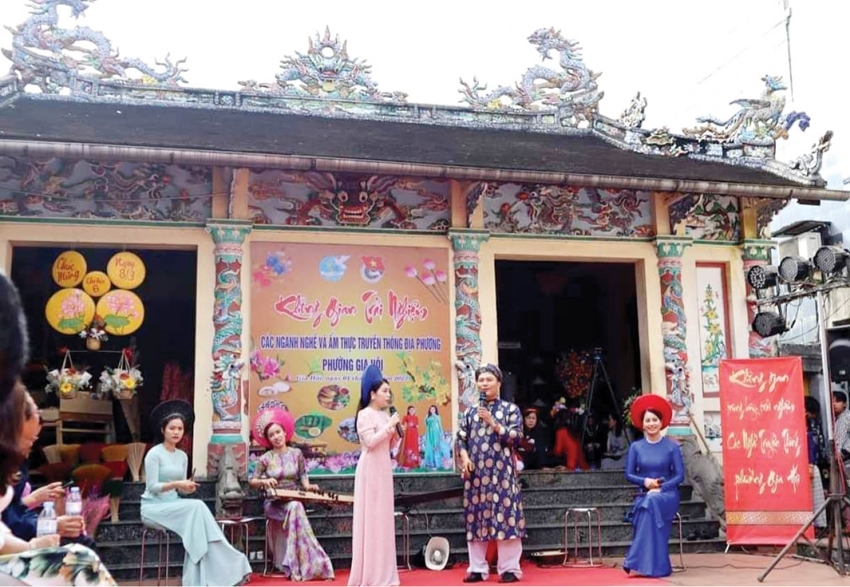    |
 |
| Phu Cat communal house (Gia Hoi) is a venue not only for worshiping and gathering of the locals, but also for organizing Hue cultural experience activities so as to contribute to the preservation of cultural values |
Kim Long communal house (Kim Long Ward) is located on the left bank of the Huong River, 3km west of the city center. This is one of the ancient communal houses with more than 300 years of existence.
The communal house facing the Huong River, with pillars and unique porcelain mosaic dragon-horse guarding screens in the front entrance, is the place to worship the ancestors who reclaimed the village and established the hamlet of Kim Long village.
As time passing by, the communal house was degraded and damaged. Therefore, in 2022, the People’s Council of Hue City approved the investment policy of the project of repairing and preventing deterioration of the main hall, with an area of 210 square meters, and a funding of nearly VND 5.5 billion.
The project includes the categories of dismantling the entire hall; applying anti-termite treatment in the entire area of the building; repairing, embellishing and restoring the entire hall, pillars and guarding screens in original state. In addition, the front yard, with an area of 150 square meters will be paved. Currently, the construction units have dismantled and gone on repairing the building, and expected to complete the project by the end of 2024.
An Cuu communal house (Alley 33, An Duong Vuong Street, Hue City) was recognized by the Provincial People's Committee as a provincial-level historical relic of the revolution since 2008. The communal house was built in a unique traditional style, and is highly evaluated for its architectural art.
However, for many years now, the community cultural activities in this communal house have been limited, as the entire roof system has been damaged; the wooden structures are mostly rotting; the walls are leaking, mossy, rotting, and plaster peeled off in large pieces; …
In the face of that situation, and after making survey and study of the current state, in September 2022, the People’s Council of Hue City approved the investment policy for the project of conservation, and restoration of An Cuu communal house relic.
Accordingly, the project aims to repair, prevent degradation of the relic, to serve the preservation, exploitation and promotion of the relic’s value. The investment includes repairing, preventing degradation of the main hall and the vestibule, dismantling damaged structures of the building; restoring the entire building in its original state; applying anti-termite treatment, waterproofing, and anti-flooding in its area; as well as investing in lighting system.
The project has a total investment of VND 9.8 billion, and been deployed in two years, 2023 and 2024, from the State budget.
Along with the two projects above, in 2023, Hue City is repairing and restoring several more communal houses, namely Xuan Hoa communal house (Huong Long), and Duong Xuan Ha communal house (Thuy Xuan), etc. Previously, Hue City had invested VND 1 billion to urgently repair the relic of Phu Xuan communal house (Tay Loc), the relic of the khai-canh temple (the temple of the man who first reclaimed the land and established the village) of The Lai Thuong village in The Lai Thuong communal house (Gia Hoi).
According to leaders of the People's Committee of Hue City, the city is currently directly managing 33 relics, including 12 national-level relics and 21 provincial-level relics, with 16 communal houses.
In order to improve the efficiency of the management, conservation and promotion of the values of the ranked relics in the area; at the same time, ensuring the legality and science of the relic profiles, the city has coordinated with the Provincial Museum of History and the People's Committees of wards and communes to conduct surveys and agree on a plan to adjust the profiles of a number of ranked relics.
Accordingly, six national-level and provincial-level relics in wards and communes in the city area are expected to have their profiles adjusted, including: the location of the Frontline Youth School, the temple and tombs of Nguyen Khoa Dang - Nguyen Khoa Chiem, the tomb area and the temple of the ancestor of the jewelry industry, the temple of ancient music, the Ba Don cemetery and pagoda, and the headquarters of Hue Student Union.
Up to now, 16 relics in the city area have been surveyed, whose profiles are submitted to competent authorities for consideration and adjustment, contributing to the effective implementation of the criteria in the scientific dossier for the ranking of the cultural and historical sites and scenic spots in the area.
